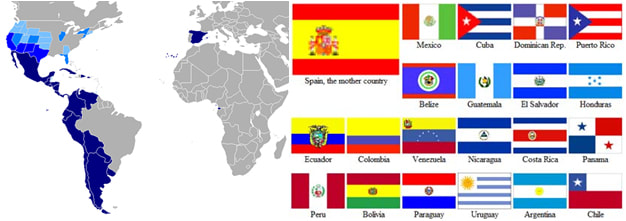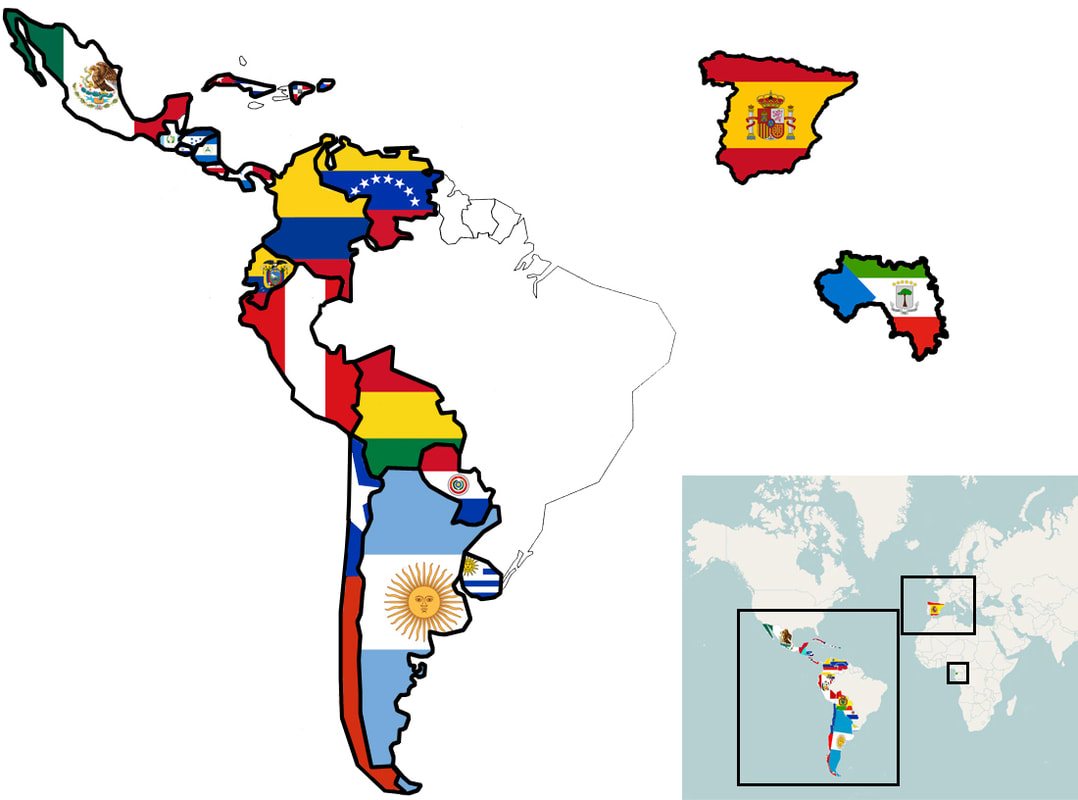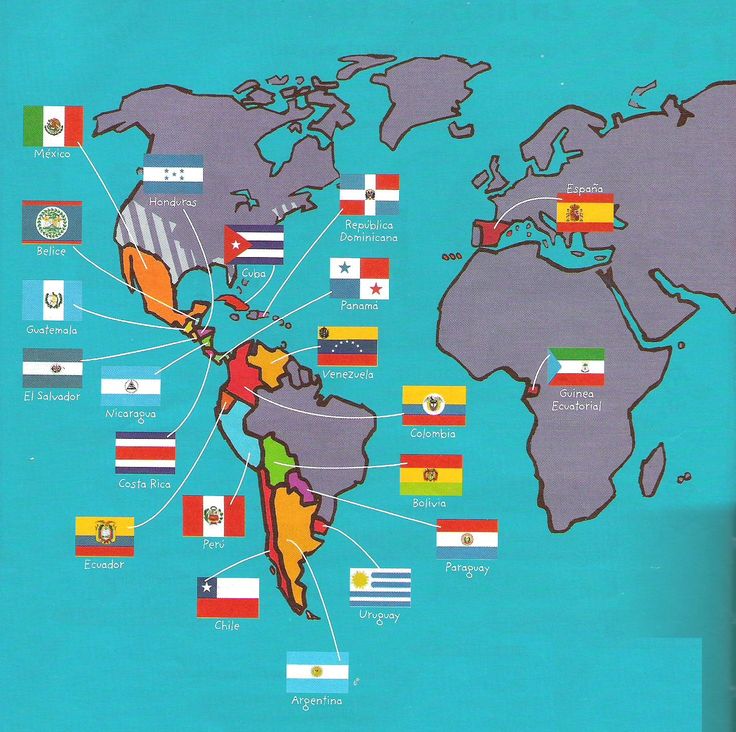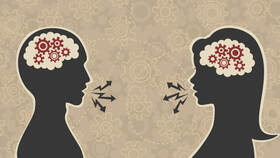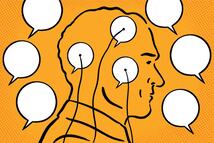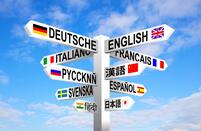It's important to learn spanish!
According to a 2022 report from Instituto Cervantes, the numbers of Spanish speakers has increased yet again. (To read the full report, click here.)
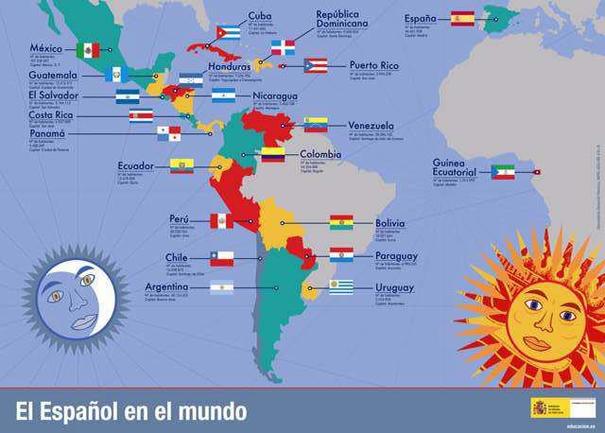
* Spanish is the world’s #2 language in terms of native speakers (behind Mandarin Chinese). It's the world’s #4 in terms of total number of speakers (after English, Mandarin and Hindi). And it’s the #3 most used language on the web (after English and Mandarin).
* 595 million worldwide speak Spanish: 496 as their first language and 24 million are studying it
* Spanish is the official language in 20 countries (19 of which are in our neighborhood of the world) plus Puerto Rico. It’s also the co-official language in Equatorial Guinea.
* The world’s #2 largest Spanish-speaking population lives in the USA (58 million)—and the U.S. is the world’s fourth largest Spanish speaking country.
* Instituto Cervantes estimates that by 2060 27.5% of the US population will be of Hispanic origin and the US will be the world’s second largest Spanish speaking country.
* 75% of U.S. foreign language students in the USA study Spanish.
* There are more bilingual people in the world than there are people who speak one language. (Just think: In Brooklyn, NY, 47% of residents speak a second language at home!)
So remember...
* Spanish is not a “class” or “subject” It’s a skill! It’s a vehicle for learning anything.
* Students who develop proficiency in Spanish have a competitive edge in admission to higher education and in today’s global job-market—regardless of career choice.
These all are eye-popping statistics. But if you're a visual kind of person who thinks that "a picture is worth a thousand words," then take a look at these maps:
It takes time - so stick with it!
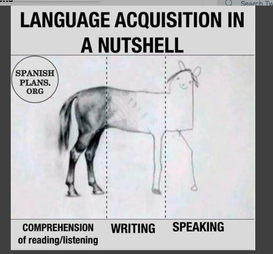
The rewards of being proficient in a second language are HUGE.
But it takes consistent effort over time to become proficient.
Imagine it's like a plane taking off on a really, really long runway: It'll eventually get off the ground, but it takes work to get airborne. And sometimes it can be frustrating.
When you get frustrated with speaking especially, remember that proficiency in speaking is a skill that's acquired after you can read, listen and write with proficiency..
So don't get discouraged—and if you do, just look at the sketch (left) and then keep trying. I guarantee that if you do, you'll take flight!
But it takes consistent effort over time to become proficient.
Imagine it's like a plane taking off on a really, really long runway: It'll eventually get off the ground, but it takes work to get airborne. And sometimes it can be frustrating.
When you get frustrated with speaking especially, remember that proficiency in speaking is a skill that's acquired after you can read, listen and write with proficiency..
So don't get discouraged—and if you do, just look at the sketch (left) and then keep trying. I guarantee that if you do, you'll take flight!
does being bilingual affect your decision-making? ¡Sí!
According to a new study, bilinguals may make different choices depending on the language they're thinking in. A write-up on the study was published on February 19, 2020 in the Washington Post. If you have a subscription, the article is called "Bilingual people may make different choices depending on the language they're thinking in. Here's how."
being bilingual makes you smarter
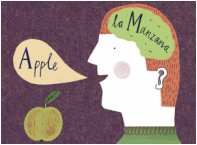
According to the New York Times, research says that bilinguals are smarter:
SPEAKING two languages rather than just one has obvious practical benefits in an increasingly globalized world. But in recent years, scientists have begun to show that the advantages of bilingualism are even more fundamental than being able to converse with a wider range of people. Being bilingual, it turns out, makes you smarter. It can have a profound effect on your brain, improving cognitive skills not related to language and even shielding against dementia in old age.
For the full text of the article, click here.
In addition, according to Middlebury College, here are five more reasons bilinguals are smarter:
SPEAKING two languages rather than just one has obvious practical benefits in an increasingly globalized world. But in recent years, scientists have begun to show that the advantages of bilingualism are even more fundamental than being able to converse with a wider range of people. Being bilingual, it turns out, makes you smarter. It can have a profound effect on your brain, improving cognitive skills not related to language and even shielding against dementia in old age.
For the full text of the article, click here.
In addition, according to Middlebury College, here are five more reasons bilinguals are smarter:
- Students who study a world language for just one year score an average of 38 points higher on the SATs. (Even cooler: Students who took four years of a world language showed scores that were more than a hundred points higher on average.)
- Do you ever find it hard to do two things at once? The National Institutes of Healthdiscovered that people who speak more than one language are much better at multitasking, which means walking on your hands while chewing gum should be a breeze.
- People who know two languages are nicer. 2012: The year that researchers at the University of Cambridge discovered that people who know two languages are nicer. According to the research, bilingual folks are better able to tolerate differences and find solutions to conflict.
- Eight hundred thirty-five 11-year-olds were tested on their cognitive ability in Scotland in 1947. Between 2008 and 2010, those same people were retested when they were in their seventies. Of the 835 case studies, 260 knew at least two languages. Those 260 people tested significantly higher in cognitive function than their solely English-speaking peers.
What happens in your brain when you flip between languages?

Published in Newsweek, 9/10/18, researchers report on what mechanisms in the brain allow for bilingual people to switch effortlessly between languages. They say, "while those who swap between languages may make it seem easy, it is in fact 'a remarkably complicated process that involves the successful coordination of two independent language systems.'" To read all about it: Click here.
WHAT DOES RESEARCH SHOW ABOUT THE BENEFITS OF LANGUAGE LEARNING?
Don't take Sra. Bozzone's word about the myriad benefits of language learning. See what science says! Click here.
Why learn another language?

According to a poster developed by Middlebury College:
Why learn another language? Because...
Why learn another language? Because...
- It can raise your grades in other subjects.
- You’ve always wanted to be an international spy, right?
- Your future best friend may speak it.
- It can help you conquer those bubble tests.
- It makes you more creative.
- It’s good for your brain.
- It can help you get into your dream college.
- It can help you land an awesome job.
- The bigger your world is, the bigger your heart.
bilingual = More creative
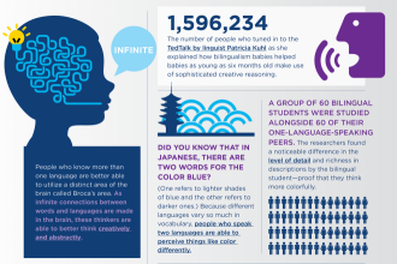
Middlebury College also offers five reasons why bilinguals are more creative:
- People who know more than one language are better able to utilize a distinct area of the brain called Broca’s area. As infinite connections between words and languages are made in the brain, these thinkers are able to better think creatively and abstractly.
- 1,596,234: The number of people who tuned in to the TedTalk by linguist Patricia Kuhlas she explained how bilingualism helped babies as young as six months old make use of sophisticated creative reasoning.
- Did you know that in Japanese, there are two words for the color blue? (One refers to lighter shades of blue and the other refers to darker ones.) Because different languages vary so much in vocabulary, people who speak two languages are able to perceive things like color differently.
- A group of 60 bilingual students were studied alongside 60 of their one-language-speaking peers. The researchers found a noticeable difference in the level of detail and richness in descriptions by the bilingual student—proof that they think more colorfully.
- Bilingual children showed a statistically significant increase in mathematical creativity(that’s code for thinking outside of the box) as early as 45.4 months. That’s less than four years old.
IT's a must!

"Whether one pursues a career in teaching, health care, international business, diplomacy, social services, law enforcement, or other endeavors, the ability to communicate proficiently in a language other than English is no longer a luxury--it is a necessity," according to the Foreign Language Annals (Vol. 47, No. 3, Fall '14, page 540). In the same issue on page 535, it's reiterated that teachers should use the target language 90% of the time in the classroom.
Also, according to Russell Berman--Stanford University professor and former Modern Languages Association president, in college "one of the best choices you can make..is the decision to learn a foreign language, whatever your major...Knowledge of another language can pave the way for advanced study in a wide range of fields and give you a chance to build the kinds of expertise that someone with out those language abilities would not be able to master."
Also, according to Russell Berman--Stanford University professor and former Modern Languages Association president, in college "one of the best choices you can make..is the decision to learn a foreign language, whatever your major...Knowledge of another language can pave the way for advanced study in a wide range of fields and give you a chance to build the kinds of expertise that someone with out those language abilities would not be able to master."
built-in exercise for the brain

Learning another language keeps your mind sharp, no matter your age, says a study from Northwestern University published in the journal "Brain and Language." In addition it affirms that "speaking more than one language constantly exercises the brain and makes it more prepared to take on other brain-challenging tasks." For more, click here.
See the world differently

Speaking a second language may change how you see the world - and your thinking can be more flexible. according to a new study. For example, what do you see in the photo (left?? English speakers see this image differently than German-speakers. Bilinguals can see if from both perspectives. It's a fascinating concept, but hard to explain. You can read more about the study by clicking here.
In addition, another study has found that bilingual people may make different decisions depending on the language they're thinking in. For more on this study, a summary of which was published in the Washington Post, click here. And still another article underscores how language seems to shape one's view of the world: click here. |
make your brain bigger

Learning a foreign language can increase the size of your brain, this according to a recent study. Yes, and also according to this study, "We know that people who speak more than one language fluently have better memories and are move cognitively creative and mentally flexible than monolinguals." For more, click here.
Language learning boosts brain plasticity and ability to code new information

The more languages you know, the more connections your brain makes! Researchers studying the human brain and language acquisition have found that the more foreign languages a person learns, the faster the brain responds and processes the information it absorbs. Researchers from Russia and Finland used electroencephalography as part of the study. Published in Medical News Today, September 5 2016: Click here.
bilingual brains have better attention and focus

Bilingual is better, yet another study finds. (Published in journal "Bilingualism: Language and Cognition, September 9, 2016) Yes, scientists have found another incentive for you to make the most of your Spanish class with Señora Bozzone. According to researchers knowing more than one language can help boost our powers of attention and focus. Check out the summary. Click here.
HOW TO LEARN A NEW LANGUAGE: 7 TIPS FROM TED TRANSLATORS
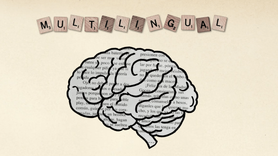
Knowing more than one language is great for your brain. But what’s the best way to learn? TED’s Open Translation Project volunteers share tips. Below are a few. For the complete list, click here.
1. Get real. Decide on a simple, attainable goal to start with so that you don’t feel overwhelmed. Pick up 50 words of a language and start using them on people — and then slowly start picking up grammar.
2. Let technology help you out. A funny thing like resetting the language on your phone can help you learn new words right away.
3. Do not worry about making mistakes. One of the most common barriers to conversing in a new language is the fear of making mistakes.
1. Get real. Decide on a simple, attainable goal to start with so that you don’t feel overwhelmed. Pick up 50 words of a language and start using them on people — and then slowly start picking up grammar.
2. Let technology help you out. A funny thing like resetting the language on your phone can help you learn new words right away.
3. Do not worry about making mistakes. One of the most common barriers to conversing in a new language is the fear of making mistakes.
The power of the bilingual brain
" A bilingual brain is not necessarily a smarter brain, but it is proving to be a more flexible, more resourceful one. In a polyglot world, that's a lesson that a largely monoglot country like the U.S. ignores at its peril. 'Monolingualism,' says Gregg Roberts, a language-immersion specialist with the Utah state office of education, "is the illiteracy of the 21st century."
For more from this 2013 Time Inc. article, click here.
For more from this 2013 Time Inc. article, click here.
Are you frustrated in spanish class? don't give up!
If you know more than one language now--or are learning one in school, don't give it up! Research gives you plenty of reasons to keep at it. Click here.
Bilinguals may perceive time differently
"Unlike Hollywood, we're not claiming that bilinguals can see into the future," says the author of a recent study about the brain, bilinguals and time, " but learning a language really does rewire the brain." He adds, "Mentally going back and forth between different languages and ways of understanding time is actually brain training. You are sending your brain to the gym." To read more, click here.
Top ten best proverBs about language learning
Age-old wisdom teaches us that learning another language is important. For example, "Those who know many languages live as many lives as the languages they know" goes one proverb, and another says, "To learn a language is to have one more window from which to look at the world." For more sage "sayings" on language learning, click here for an article from LingHolic.
How IMMERSION HELPS TO LEARN A LANGUAGE
|
A study found that foreign-language learners can achieve nativelike processing with increased practice. ¿Parece mentira? Find out more by clicking here.
|
Can bilingualism protect against Alzheimer's?
|
New research published in the journal Neuropsychologiareveals that bilingualism makes changes in brain structure that are linked with resilience against Alzheimer’s disease and mild cognitive impairment. For more, click here. Another study had similar findings as you can read by clicking here.
|
MORE: Can being bilingual stave off dementia?
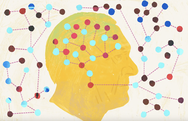
Can learning a language stave off dementia? According to a New York Times article published on January 16, 2024, that may be the case: "Research suggests that bilingual people enjoy some cognitive benefits later in life, but it probably requires more than a few Spanish lessons in your 60s." To find out more, click to read the article "Can Learning a New Language Stave Off Dementia?" by Dana G. Smith. www.nytimes.com/2024/01/16/well/mind/dementia-bilingual-language.html
Is Spanish spoken faster than English?

Is it your imagination or do Spanish speakers speak faster than we do? Or is it just that you don't know the language?
A new study
sheds some light on this question.
To read a summary of it, click here.
StudY: Your brain wires itself to match your native language
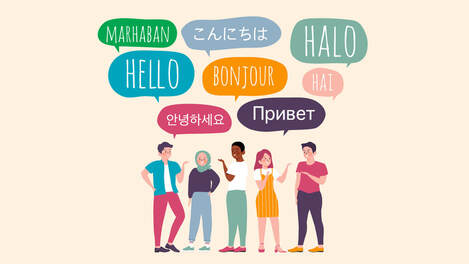
According to the summary of a study published in "Science News," your bring wires itself to match your native language. Wiring patterns seem to reflect grammatical characteristics specific to different languages. The article begins, "The language we learn growing up seems to leave a lasting, biological imprint on our brains." To find out more about what neuroscientists discovered, click here.
